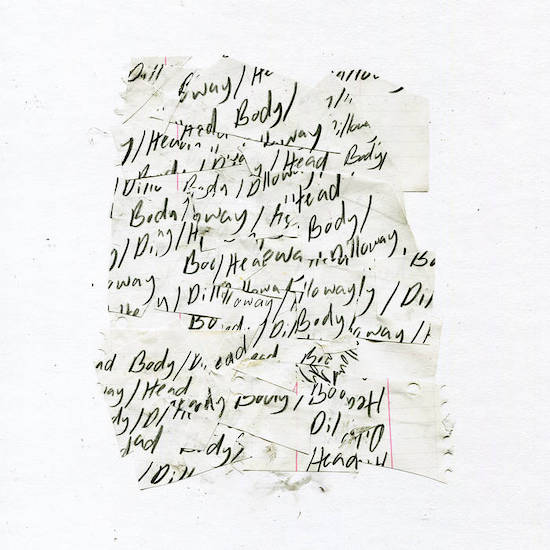Jackson Mac Low introduces ‘Phone’, his 1978 performance for Public Access Poetry, as “a spontaneous poem with ten variations on it.” The piece begins as a melancholy lament of unrequited love through the phone, but Mac Low, a poet, performance artist, and occasional collaborator with John Cage, proceeds to unravel the text with each repetition.
Using nothing more than his voice and a sheet of paper, Mac Low unearths new patterns of words, syllables and sounds – meanings spiraling out in a beautiful mess. Its form almost seems to prefigure glitch, yet the human element feels crucial to the piece’s startling effect. Mac Low unearthing new emotional connections as he tugs at the forces holding the initial poem together.
Body/Dilloway/Head is the new noise supergroup of Body/Head (aka Bill Nace and Kim Gordon) and Aaron Dilloway (ex-Wolf Eyes member, prolific solo tape mangler and recent collaborator with Lucrecia Dalt). And on their self-titled debut, they pull at the webs holding together charred guitar, spoken word, and the recorded medium itself in a way which echoes Mac Low’s interrogation of lines of text.
Opener ‘Body/Erase’ begins with a barely-there bed of tape hum and garbled voice strung through the spools. It might be Gordon speaking, but the audio is so warped and stretched it’s impossible to be sure. Spinning into a wall of tape blur, the guitars eventually arrive blanketed in the same dark, cracked minimalism Body/Head perfected on ‘The Switch’. Here, they’re jolted and split from gravity, like a punctured tire going slack on the wheel.
The album is built on a crossing of flows. The wave-like, psyche drift of Body/Head dissected through Dilloway’s wonky splice and cut-up mechanisms. Elegant guitar fractures sucked into an off-kilter prankster groove reminiscent of that summoned on Dilloway 2012’s album, Modern Jester. But this isn’t a one-way street or simple remix of Body/Head. The guitar churn pushes back, glistening shimmers and frail drones managing to spark free in elegant escape from the strange machine gait. As though the three players are tethered together through a misfiring biofeedback loop.
Closer ‘Secret Cuts’, which sees Gordon’s voice featured most prominently, has this strange duality play out most clearly. Swinging from crumpled miasmas into a gnarled and battered riff, a strange new intimacy between human, machine and medium starts to creep through.
There’s a temptation to label Body/Dilloway/Head deconstruction, but it seems more about tugging at interactions without actually breaking them. Instead, Dilloway, Gordon, and Nace stick in a precarious balancing act, a taut zone between form and formlessness. Like Mac Low, it doesn’t seem about recklessly pulling something asunder, but poking at the glue that holds the parts together. Delving into errs and stumbles and finding the poignancy that resides within.



